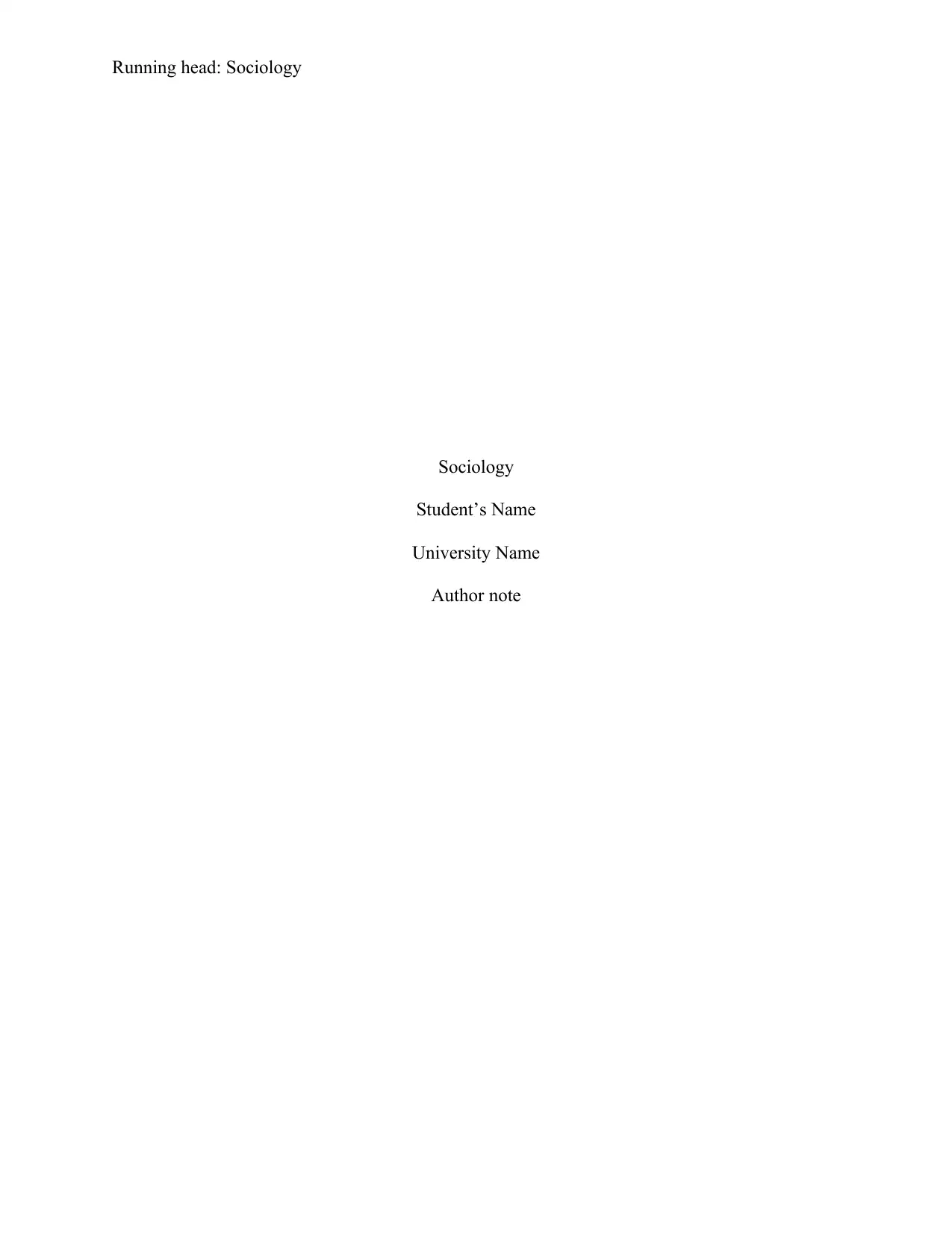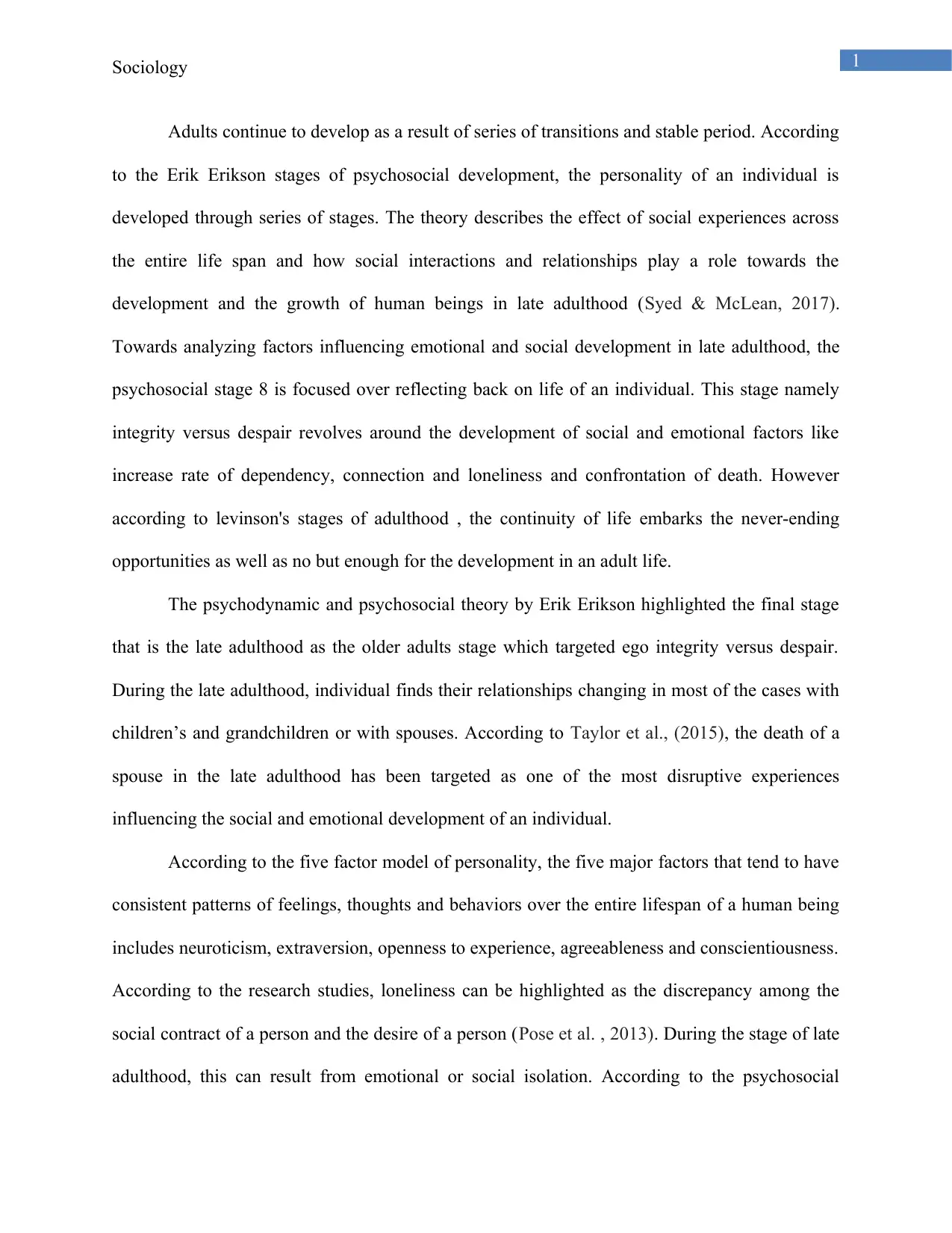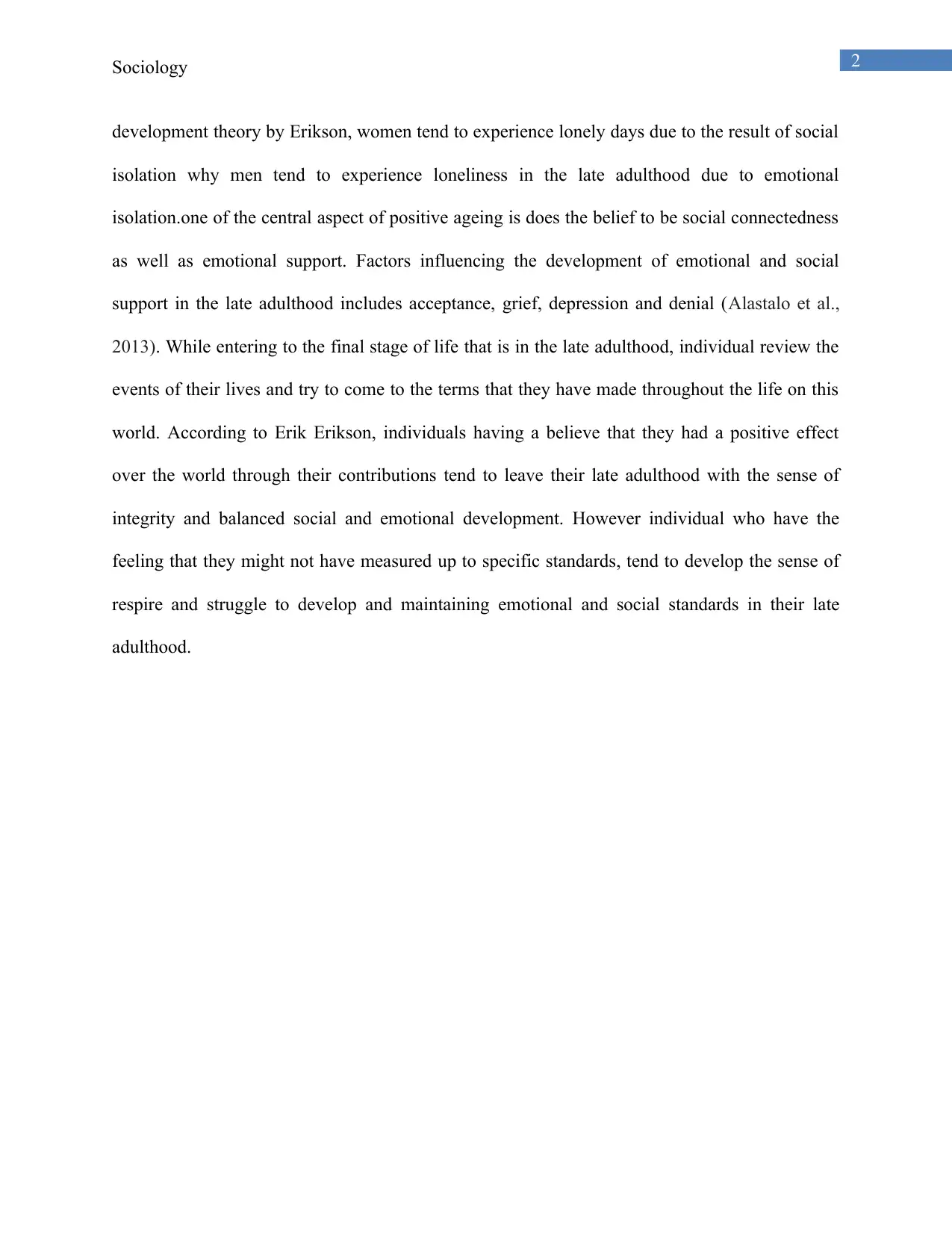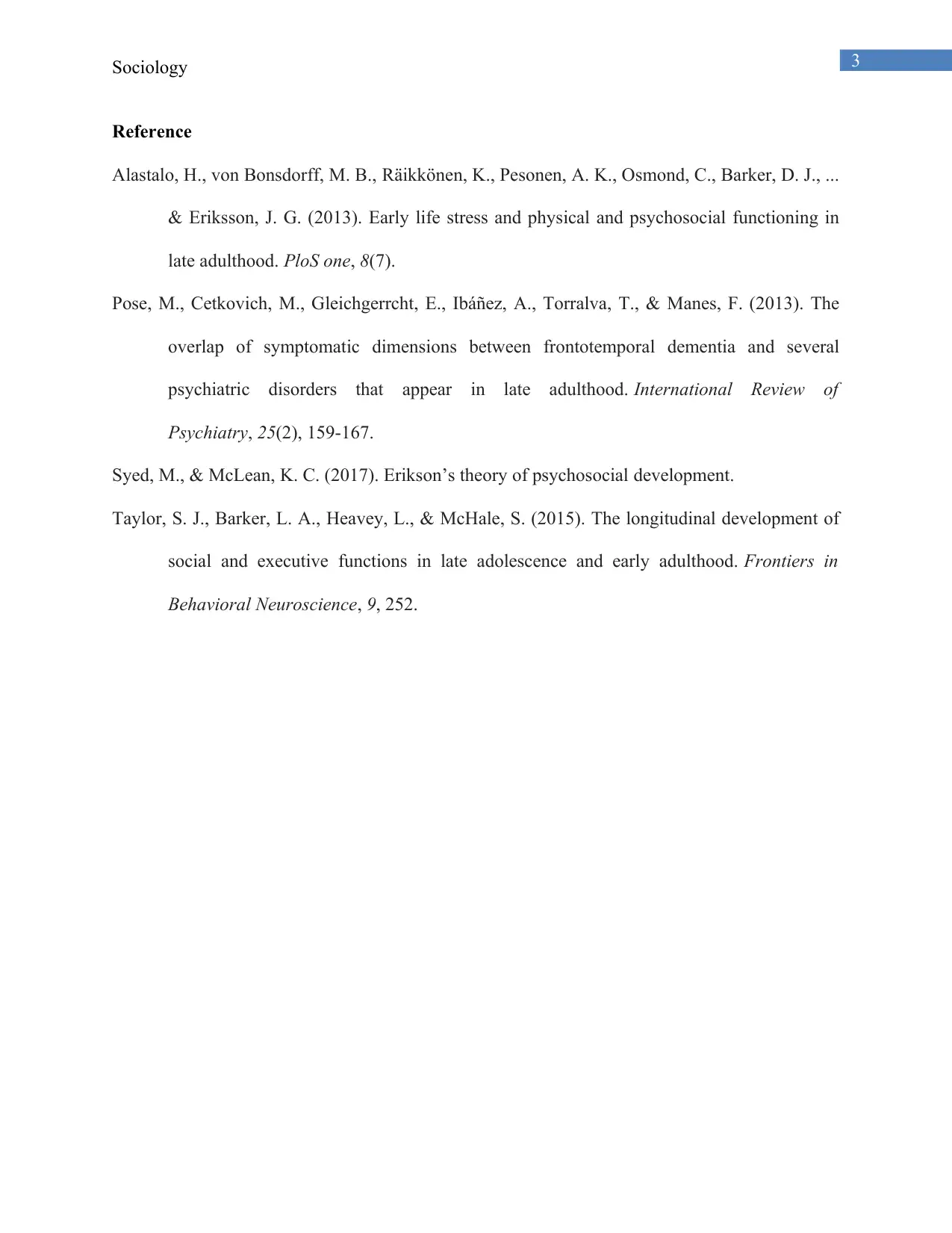Psychosocial Development Theory by Erikson
VerifiedAdded on 2022/08/18
|4
|760
|67
AI Summary
Contribute Materials
Your contribution can guide someone’s learning journey. Share your
documents today.

Running head: Sociology
Sociology
Student’s Name
University Name
Author note
Sociology
Student’s Name
University Name
Author note
Secure Best Marks with AI Grader
Need help grading? Try our AI Grader for instant feedback on your assignments.

1Sociology
Adults continue to develop as a result of series of transitions and stable period. According
to the Erik Erikson stages of psychosocial development, the personality of an individual is
developed through series of stages. The theory describes the effect of social experiences across
the entire life span and how social interactions and relationships play a role towards the
development and the growth of human beings in late adulthood (Syed & McLean, 2017).
Towards analyzing factors influencing emotional and social development in late adulthood, the
psychosocial stage 8 is focused over reflecting back on life of an individual. This stage namely
integrity versus despair revolves around the development of social and emotional factors like
increase rate of dependency, connection and loneliness and confrontation of death. However
according to levinson's stages of adulthood , the continuity of life embarks the never-ending
opportunities as well as no but enough for the development in an adult life.
The psychodynamic and psychosocial theory by Erik Erikson highlighted the final stage
that is the late adulthood as the older adults stage which targeted ego integrity versus despair.
During the late adulthood, individual finds their relationships changing in most of the cases with
children’s and grandchildren or with spouses. According to Taylor et al., (2015), the death of a
spouse in the late adulthood has been targeted as one of the most disruptive experiences
influencing the social and emotional development of an individual.
According to the five factor model of personality, the five major factors that tend to have
consistent patterns of feelings, thoughts and behaviors over the entire lifespan of a human being
includes neuroticism, extraversion, openness to experience, agreeableness and conscientiousness.
According to the research studies, loneliness can be highlighted as the discrepancy among the
social contract of a person and the desire of a person (Pose et al. , 2013). During the stage of late
adulthood, this can result from emotional or social isolation. According to the psychosocial
Adults continue to develop as a result of series of transitions and stable period. According
to the Erik Erikson stages of psychosocial development, the personality of an individual is
developed through series of stages. The theory describes the effect of social experiences across
the entire life span and how social interactions and relationships play a role towards the
development and the growth of human beings in late adulthood (Syed & McLean, 2017).
Towards analyzing factors influencing emotional and social development in late adulthood, the
psychosocial stage 8 is focused over reflecting back on life of an individual. This stage namely
integrity versus despair revolves around the development of social and emotional factors like
increase rate of dependency, connection and loneliness and confrontation of death. However
according to levinson's stages of adulthood , the continuity of life embarks the never-ending
opportunities as well as no but enough for the development in an adult life.
The psychodynamic and psychosocial theory by Erik Erikson highlighted the final stage
that is the late adulthood as the older adults stage which targeted ego integrity versus despair.
During the late adulthood, individual finds their relationships changing in most of the cases with
children’s and grandchildren or with spouses. According to Taylor et al., (2015), the death of a
spouse in the late adulthood has been targeted as one of the most disruptive experiences
influencing the social and emotional development of an individual.
According to the five factor model of personality, the five major factors that tend to have
consistent patterns of feelings, thoughts and behaviors over the entire lifespan of a human being
includes neuroticism, extraversion, openness to experience, agreeableness and conscientiousness.
According to the research studies, loneliness can be highlighted as the discrepancy among the
social contract of a person and the desire of a person (Pose et al. , 2013). During the stage of late
adulthood, this can result from emotional or social isolation. According to the psychosocial

2Sociology
development theory by Erikson, women tend to experience lonely days due to the result of social
isolation why men tend to experience loneliness in the late adulthood due to emotional
isolation.one of the central aspect of positive ageing is does the belief to be social connectedness
as well as emotional support. Factors influencing the development of emotional and social
support in the late adulthood includes acceptance, grief, depression and denial (Alastalo et al.,
2013). While entering to the final stage of life that is in the late adulthood, individual review the
events of their lives and try to come to the terms that they have made throughout the life on this
world. According to Erik Erikson, individuals having a believe that they had a positive effect
over the world through their contributions tend to leave their late adulthood with the sense of
integrity and balanced social and emotional development. However individual who have the
feeling that they might not have measured up to specific standards, tend to develop the sense of
respire and struggle to develop and maintaining emotional and social standards in their late
adulthood.
development theory by Erikson, women tend to experience lonely days due to the result of social
isolation why men tend to experience loneliness in the late adulthood due to emotional
isolation.one of the central aspect of positive ageing is does the belief to be social connectedness
as well as emotional support. Factors influencing the development of emotional and social
support in the late adulthood includes acceptance, grief, depression and denial (Alastalo et al.,
2013). While entering to the final stage of life that is in the late adulthood, individual review the
events of their lives and try to come to the terms that they have made throughout the life on this
world. According to Erik Erikson, individuals having a believe that they had a positive effect
over the world through their contributions tend to leave their late adulthood with the sense of
integrity and balanced social and emotional development. However individual who have the
feeling that they might not have measured up to specific standards, tend to develop the sense of
respire and struggle to develop and maintaining emotional and social standards in their late
adulthood.

3Sociology
Reference
Alastalo, H., von Bonsdorff, M. B., Räikkönen, K., Pesonen, A. K., Osmond, C., Barker, D. J., ...
& Eriksson, J. G. (2013). Early life stress and physical and psychosocial functioning in
late adulthood. PloS one, 8(7).
Pose, M., Cetkovich, M., Gleichgerrcht, E., Ibáñez, A., Torralva, T., & Manes, F. (2013). The
overlap of symptomatic dimensions between frontotemporal dementia and several
psychiatric disorders that appear in late adulthood. International Review of
Psychiatry, 25(2), 159-167.
Syed, M., & McLean, K. C. (2017). Erikson’s theory of psychosocial development.
Taylor, S. J., Barker, L. A., Heavey, L., & McHale, S. (2015). The longitudinal development of
social and executive functions in late adolescence and early adulthood. Frontiers in
Behavioral Neuroscience, 9, 252.
Reference
Alastalo, H., von Bonsdorff, M. B., Räikkönen, K., Pesonen, A. K., Osmond, C., Barker, D. J., ...
& Eriksson, J. G. (2013). Early life stress and physical and psychosocial functioning in
late adulthood. PloS one, 8(7).
Pose, M., Cetkovich, M., Gleichgerrcht, E., Ibáñez, A., Torralva, T., & Manes, F. (2013). The
overlap of symptomatic dimensions between frontotemporal dementia and several
psychiatric disorders that appear in late adulthood. International Review of
Psychiatry, 25(2), 159-167.
Syed, M., & McLean, K. C. (2017). Erikson’s theory of psychosocial development.
Taylor, S. J., Barker, L. A., Heavey, L., & McHale, S. (2015). The longitudinal development of
social and executive functions in late adolescence and early adulthood. Frontiers in
Behavioral Neuroscience, 9, 252.
1 out of 4
Related Documents
Your All-in-One AI-Powered Toolkit for Academic Success.
+13062052269
info@desklib.com
Available 24*7 on WhatsApp / Email
![[object Object]](/_next/static/media/star-bottom.7253800d.svg)
Unlock your academic potential
© 2024 | Zucol Services PVT LTD | All rights reserved.





